
If the sight of a plate of broccoli makes you gag, this post is for you!
We’ll turn any “Veggie Hater” into a “Vegetable Lover” by showing you how to make a plate full of greens not taste like a wet gym sock [1].
If you’ve been a picky eater your whole life (I didn’t eat veggies until 22!), our guide today will help level up your taste buds!

We work closely with our Online Coaching Clients to help them find their gateway vegetables, and I even picked our coaches’ brains to get their favorite tactics in this guide too.
By the end of this guide, I’m going to have you excited to eat vegetables, and ready to take the “NF Veggie Challenge”:
- Why You Should Eat Vegetables (Your Mom Was Right)
- How to Start Eating Vegetables (Finding Your Gateway Veggie)
- How to Buy Vegetables (Discovering New Veggies)
- 10 Ways to Make Vegetables Taste Good (Hide Them)
- How to Start Liking Vegetables (It’s All in the Preparation)
- What Are the Best-Tasting Vegetables? (the NF Veggie Challenge)
Why You Should Eat Vegetables
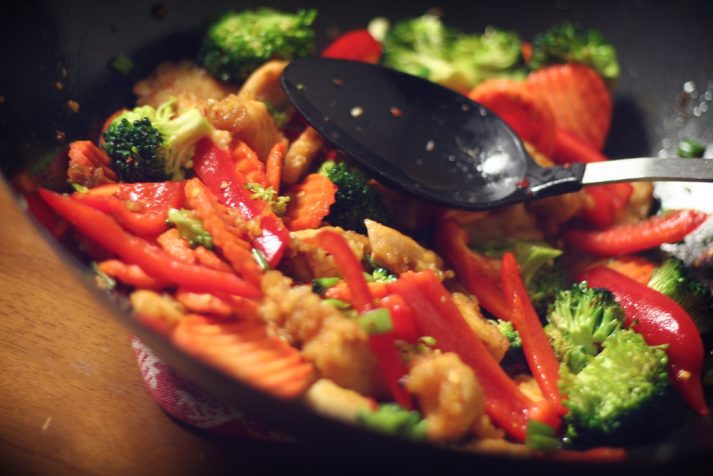
You’ve probably been told since you were a toddler to “Eat your vegetables! They’re good for you.”
Do you really know WHY they’re good for you? Let me jump into a few reasons why vegetables kick ass.
1) Vegetables are nutrient-dense. It should be no surprise that Popeye turned to a vegetable when he needed a power-up.

Think of vegetables as one of our body’s most efficient fuel sources: they are packed full of vital macro and micronutrients.
Just take a look at our article on how to eat healthy – it should be no surprise that vegetables take up half the plate in our “healthy plate” strategy.
Simply put: vegetables are the backbone of any solid diet.
2) They fill you up, without “filling you up.”
Ever seen what 200 calories worth of broccoli looks like (courtesy of WiseGeek)?
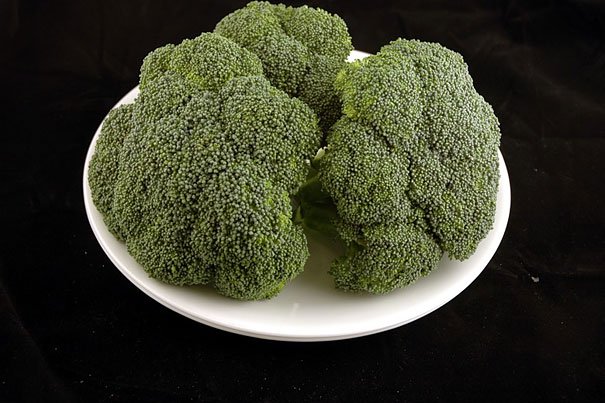
It’s the size of a grocery bag compared to 200 calories of a Snickers:
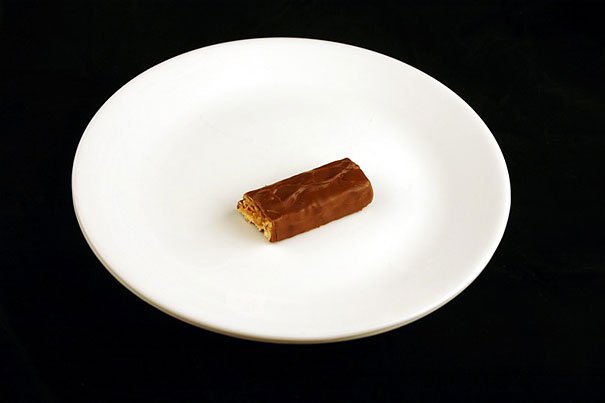
If you are feeling hungry but don’t want to overeat, choose a vegetable.
Kind of hard to overeat when you’re eating carrots or celery!
3) Veggies keep your body operating at max efficiency. Vegetables are a great way to keep your…um…indoor plumbing…functioning properly.
Adding a vegetable or two to each meal (or blending them up in a smoothie) is a great way to keep things working right.
Seriously: you will notice a considerable difference after adding veggies to your diet regularly.
4) They CAN be delicious! It’s all in how they are prepared. As a former veggie hater, I am now firmly on “Team Vegetable.”
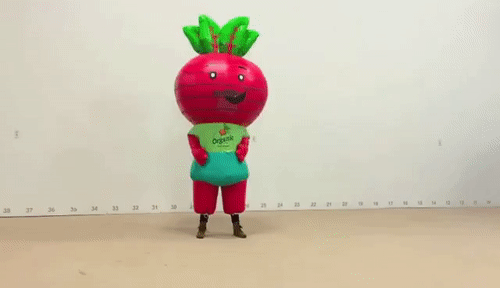
A plate full of veggies used to make me want to gag, and now I’m thrilled at the idea of a plate covered in a cornucopia (what a great word, right?) of multicolored fruits and veggies.
“Ok, Steve, I know vegetables are good for me, but I just don’t like them. HALP!”
Here’s how you can get over your vegetable-aversion and get started.
How to Start Eating Vegetables: Finding Your Gateway Veggie
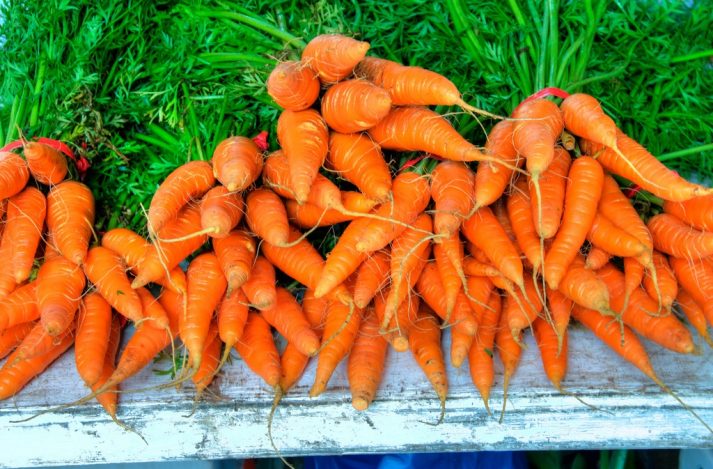
When I was 22 I proudly proclaimed that I was mostly “carnivore” and boycotted veggies.
Essentially, I ate things like chicken, hamburgers, pizza, pasta, french fries, rice, and not much else.
In my mind, all vegetables were disgusting, but the reality was that I hadn’t really tried many.

Don’t be like me.
We’re going to stop saying “I don’t like vegetables!”
Instead, we’ll say: “I haven’t found a vegetable that I LIKE…yet.”
HOW I FOUND MY GATEWAY VEGETABLE: I started using “20 Seconds of Courage” to try a new vegetable whenever the stakes were low, even if it was a TINY amount:
- I went into any new vegetable experience with an open mind and positive mindset.
- Trying any vegetable was considered a victory, even if it was a tiny amount and I hated it.
- If I went out to dinner with friends, I would ask to try a veggie from their plates. Restaurant prepared veggies were my best chance to find one I liked!

MISSION #1: Commit to try and find your gateway vegetable.
Before any new vegetable experience, clear your mind, Neo.
Instead of ALREADY expecting to hate it, change your mindset.
Instead of “This is gonna be gross,” I said, “Let’s see!”
If you’re out to dinner with family and you see a veggie you want to try on your significant other’s plate, ask and try a small bite!
Want to try and prepare a new vegetable at home? See the next section.
What if you try a vegetable and it makes you gag? Who cares! You found a veggie you don’t like. I’m proud of you for TRYING it. On to the next one!
My gateway vegetable: Asparagus.

After trying some bacon-wrapped asparagus while out at a fancy steak dinner, I realized “hey, this is one vegetable that actually doesn’t taste terrible!”
Of course, it didn’t hurt that it was literally WRAPPED IN BACON!
Next, I tried crunchy asparagus without the bacon wrapping, and it was STILL delicious to me.
And thus, I had found my gateway vegetable.
For my first year as an omnivore, asparagus was the only vegetable I ate.
Once I had gotten over the mental block that “all vegetables are gross,” it was time to branch out and repeat the process with other vegetables.
Let’s do the same for you.
How to BUY Vegetables. How to Discover New Vegetables.
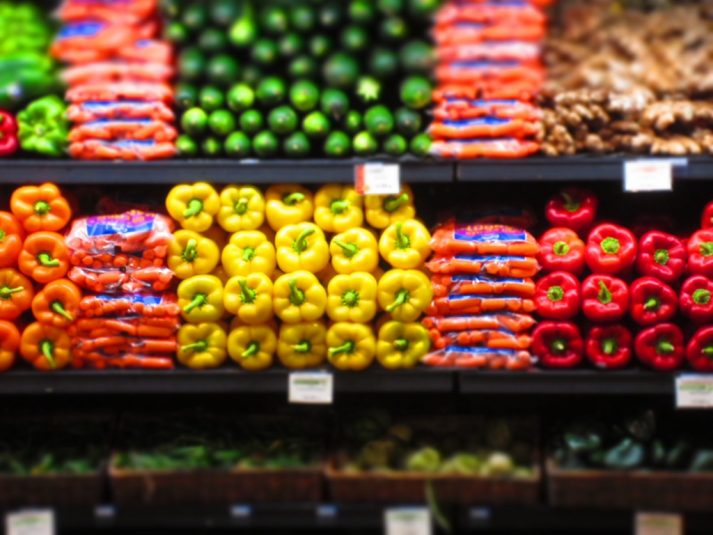
First and foremost, buying vegetables can be daunting:
- How can I tell if a vegetable is fresh or not?
- How long can I leave the vegetable in my fridge before it goes bad?
- Which ones should I buy?
For starters, here are just some of the vegetables that are Nerd Fitness approved.
MISSION #2: Pick ONE of these 25 vegetables and bring it home with you.
Who cares if you don’t know how to cook it yet. Pick one, and bring it home. Baby steps!
- broccoli
- collard greens
- kale
- romaine lettuce
- spinach
- artichokes
- asparagus
- beets
- brussels sprouts
- cabbage
- cauliflower
- celery
- cucumbers
- eggplant
- green peppers
- mushrooms
- okra
- onions
- zucchini
- acorn squash
- butternut squash
- carrots
- red peppers
- green peppers
- bok choy
NOTE: we’re not counting tubers (potatoes and sweet potatoes, legumes (beans), or corn.
Those foods do have a place on our healthy plate, but today is all bout finding low-calorie, high-energy leafy vegetables.
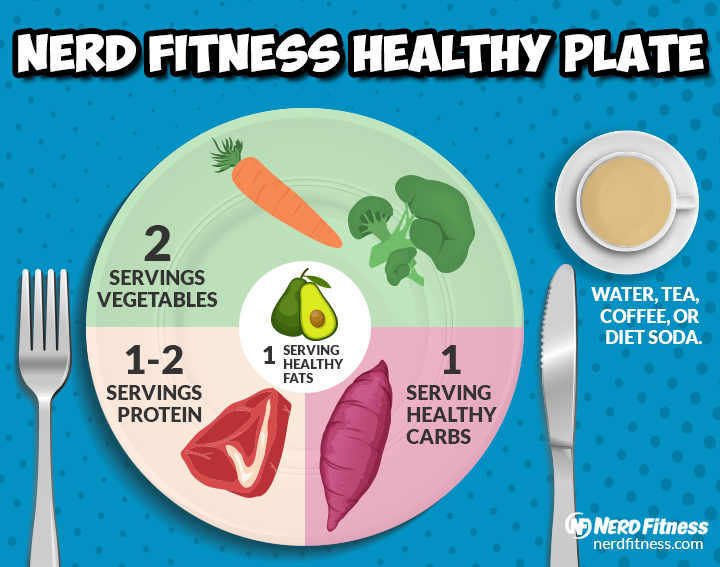
1) PICK A FRESH VEGETABLE: Use this wonderful guide on how to select fresh and tasty veggies at the grocery store.

Don’t overthink this or panic: you’re more likely than not going to pick out good veggies (provided you’re going to a reputable grocery store), but having a bit of confidence in what you’re doing can help too.
Here are a few examples of what to look for:
- Asparagus: Choose firm, smooth, and brightly-colored stalks with compact tips. Avoid limp stalks. Choose stalks of equal thickness to ensure even cooking times.
- Broccoli: Choose broccoli with firm stalks, tight florets, and crisp green leaves. Avoid yellowed or flowering florets.
- Brussels Sprouts: Choose firm, compact, bright green heads. Avoid sprouts with wilted or loose outer leaves.
Noticing a trend? You want FIRM vegetables, not soggy or squishy ones. Just start there, and look for the veggies that seem healthy to you. You can always get better at judging vegetable quality later.
2) CONSIDER PRE-CUT VEGGIES: If you’re worried about picking out fresh vegetables – I know this can be intimidating – look into buying pre-cut bags of vegetables! I personally love buying pre-cut broccoli and cauliflower, and bags of Brussels sprouts.
These are generally on the wall next to the fresh veggies, and might cost slightly more than the produce you bag up yourself.
That’s because a lot of the work is DONE FOR YOU!
I’m all for anything that reduces the number of steps between you and “veggies in your tummy:”

3) LEARN HOW LONG YOU HAVE TO EAT THE VEGGIE:
Once you’ve bought your veggies, use StillTasty.com, to figure out how long you can leave them in your fridge:
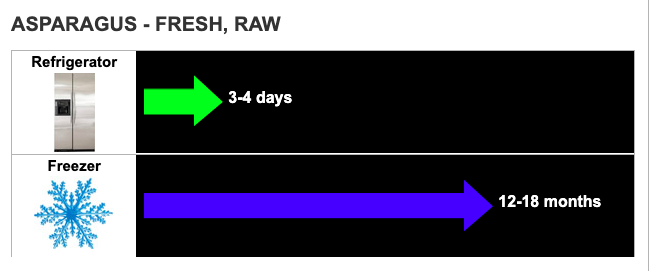
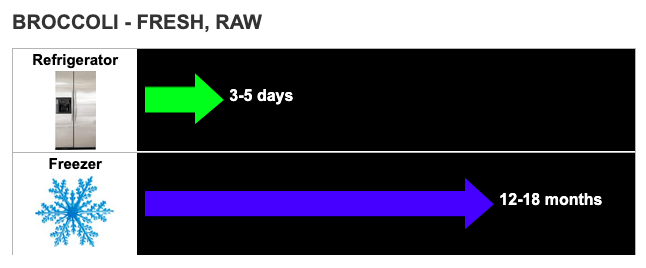

Generally speaking, you’ll be good if you cook a vegetable within 3 days of bringing it home: you can batch cook large quantities and then you’ll have MANY more days before the food goes bad.
If you’re NOT sure if you can still cook a veggie, or if it’s gone bad…give it a smell. If it smells funky, or you’re not quite sure…
Here’s a sentence my mom taught me when I started cooking for myself: “When in doubt, throw it out.”
Next time, just cook it sooner!
I can tell you eating rotten vegetables is NOT the path to liking them more.

4) CONSIDER FROZEN VEGETABLES: I always have multiple bags of frozen spinach on hand in my freezer, but it’s not because I prepare spinach regularly – I hide frozen spinach in my daily smoothies and I can’t even taste it!
In addition to frozen spinach, I also keep a few bags of microwaveable frozen veggies on hand too in case I need to quickly add a veggie to my healthy plate but don’t want to actually cook a vegetable.
I’m a huge fan of “steamfresh” bags or similar because preparing them is easy as hell: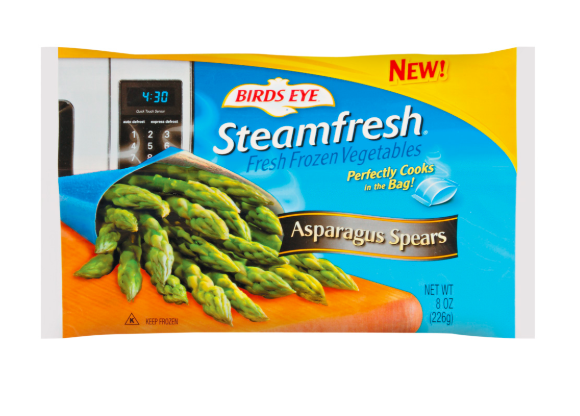 Most of these only require you throwing the bag into the microwave, opening it, and putting it on your plate.
Most of these only require you throwing the bag into the microwave, opening it, and putting it on your plate.
5) Check out canned vegetables!
They might not be as fresh as regular veggies, and there might be preservatives added to keep them from going bad, but I’d prefer you trying out canned vegetables to no vegetables at all!
Popeye eats canned spinach and he turned out okay.
Honestly, I don’t care WHICH path you pick, or which vegetable you pick…as long you commit to picking one and bringing it home with you from the grocery store.
10 Ways to Make Vegetables Taste Good

Even if you’re committed to trying more veggies (and I’m proud of you for that), it still might not solve the problem that you dislike the taste or texture.
This is the problem we encounter with many of our Online Coaching Clients: they are committed to eating vegetables, but they’re struggling with taste and texture.
Fortunately, we have a TEAM of Coaches with dozens of success stories from their clients who have learned to like vegetables with some clever tactics:
Essentially, it comes down to “hide them, blend them, pair them, or cover them!”
Here are our Coaching Staff’s 8 Favorite Ways to Make Vegetables Taste Good:
1) Change their state! I don’t enjoy raw broccoli nearly as much as I do steamed broccoli.
And that’s not even it’s final form! Give me a plate full of roasted broccoli covered in “Everything but the Bagel” seasoning from Trader Joes, and it’s Veggie Valhalla.

If you don’t like a particular vegetable yet, try preparing it a different way! From raw to steamed to baked to grilled to sautéed in bacon grease (see #4) to blended, you have so many options!
2) Blend them up! Add frozen spinach or kale to your protein shake smoothies. This is my personal favorite, and is part of the reason I get so many servings of vegetables every day.
Here’s my post-strength training workout smoothie:
- 12 oz of water.
- 2 scoops of whey protein.
- 1/2 cup of Quaker Oats.
- 1 cup of frozen mixed berries.
- 1 cup of frozen spinach.
Believe it or not, adding frozen spinach (or kale) doesn’t really change the taste AND you can get an extra serving of vegetables without trying.
That’s one extra daily serving of a super veggie!
3) Make a combo bite with a food you like: If you can learn to cook something like chicken stir fry, you can make sure that every vegetable bite also has plenty of rice and chicken.
You can do the same if you make mini potatoes, chicken, and broccoli. Get some of each on the fork with each bite for a really healthy plate!
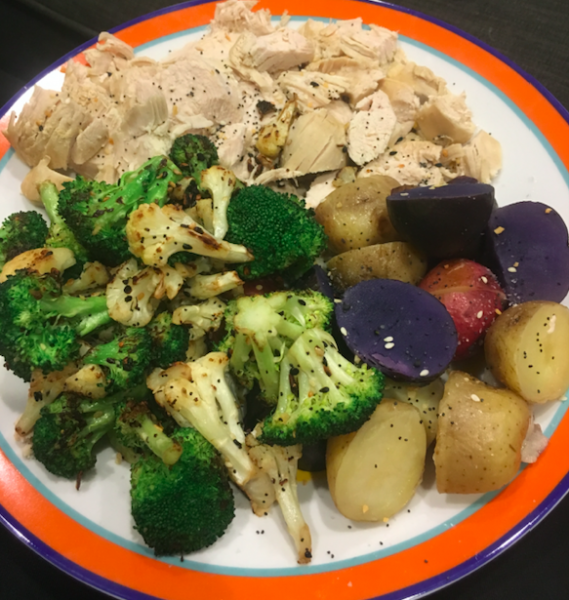
Then, over time you can reduce the amounts of the other foods and increase the amount of the vegetable until you actually enjoy the taste of JUST the vegetable!
Here are some ideas to try to squeeze in some extra veggies with every mouthful of food:
- a single broccoli crown and a big chunk of chicken.
- a chunk of grilled onions and chicken.
- rice, a wedge of zucchini, and steak.
- a slice of asparagus, and salmon.
- a wedge of sweet potato and peppers.
- steak, onions, and pineapple.
4) Cover them in cheese! As we cover in our “healthy eating” guide, we have no problem with cheese in your diet, provided you’re keeping your calorie intake in line with your daily calorie energy expenditure!
If you want to sprinkle Parmesan cheese on some broccoli florets, go for it!
You can also melt some cheese onto your veggies!
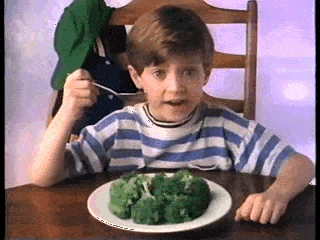
Like anything you eat, just make sure you account for those calories in your planning!
5) Wrap it in bacon. Seriously. Bacon makes everything better.
Want to learn to like asparagus? Wrap it in bacon (see #5)!
Here’s another great way to eat some veggies add bacon (courtesy of Team NF Coach Staci):
View this post on Instagram
6) Spice it up! You don’t need to just eat plain boring broccoli and steamed asparagus. Try adding some spices or hot sauce to your foods to change the taste.
Here are some of our favorites:
- Steamed cauliflower covered in Old Bay seasoning, dipped in cocktail sauce.
- Northwoods seasoning by Penzeys on baked or grilled vegetables.
- “Everything but the bagel” seasoning on baked or grilled vegetables.
- Olive oil, salt and pepper. A classic that never fails.
Here’s our guide to Spice Up Any Meal. Literally, for more.
7) Pretend they are other foods! There are lots of options like this:
- Try zucchini noodles: you might need to buy a “zoodle” machine, but boy these are tasty when mixed with other awesome foods.
- Learn to make “Paleo spaghetti” with spaghetti squash! Read our full guide on how to prepare paleo spaghetti, and thank me later.
- Make carrot “fries.”Cut some carrots into fry shapes, toss them in olive oil, put them on a baking sheet, sprinkle with salt and pepper, and roast them in the oven at 450 degrees F (230 degrees C) for 10 minutes. Tada!
- Buy “cauliflower rice” or “mashed cauliflower.” With butter and salt, and on a plate with the right foods, cauliflower can taste like rice or mashed potatoes.
8) Dunk them! Who needs chips? Pssh. You can dunk broccoli florets, cauliflower florets, or carrot sticks in hummus or guacamole.

Think of the vegetable as the delivery vehicle for your favorite dunking food!
9) Add small amounts of spinach, chard, or kale to your homemade chili or guacamole. You won’t notice the difference in the taste, and you’re sneaking extra vegetables into your meals.

I know a coaching client who got started with vegetables by adding them to low carb soups and his homemade chili.
10) Douse them in something you do love. Whether it’s ranch dressing, blue cheese, buffalo sauce, or any other sauce or condiment you enjoy, dunk those veggies and get those greens in your system!
Sure, If the sauce you’re using is really high calorie then this isn’t a long-term strategy, but we can work on that.
For now, we’re building the habit of eating vegetables. Use less sauce each week moving forward.
You can also consider lower-calorie dressings, sauces, and dips to spice things up. And you can never go wrong with hot sauce.

All of the above examples accomplish the same goal:
Getting more vegetables into your system.
This makes your stomach happy, your mother happy, and Popeye happy.
Want to work hand-in-hand (virtually) with a coach that will actually get you to eat your vegetables?
Need a brainstorm partner to find clever ways to “Trojan Horse” some veggies into your stomach?
How to Start Liking Vegetables (It’s All in the Preparation)

“Okay Steve, just give me some options and tell me what to do!”
FINE!
Here are some easy and delicious options for getting started with your first vegetable:
#1) Steamed broccoli
Level 1: Steamfresh bag in the microwave: Steamfresh veggies come in a package that you can throw in the microwave for five minutes, add seasoning, and that’s it.
Add butter or any seasoning like salt and pepper, and eat it with a protein for a healthy meal!
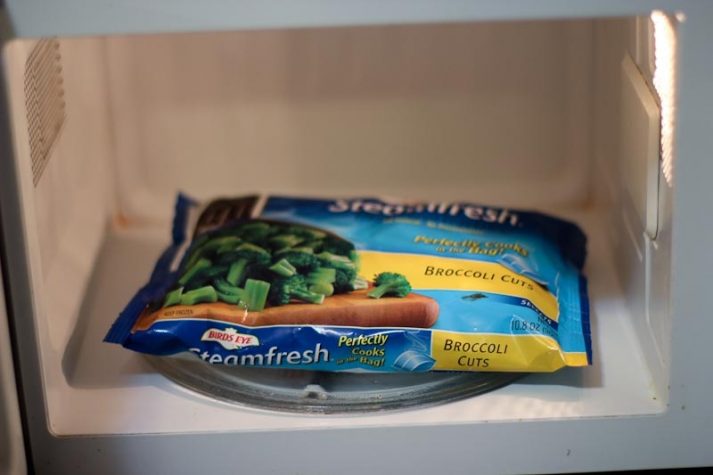
Level 2: Steam broccoli yourself in the microwave:
- Plop those florets (the “tree” minus the “trunk”) in a microwave-safe bowl with a few tablespoons of water
- Cover with a microwave-safe lid or dish
- Cook for 3-4 minutes. If the broccoli isn’t soft and warm, put it back in for a minute or two
Level 3: Steam broccoli on the stove:
- Plop about a 1/2 cup of water in the bottom of a pot
- Separating the broccoli florets from the stem
- Plop them in the water and cook over medium heat for 10-15 minutes
2) Roasted vegetables. Works with bell peppers, asparagus, carrots, onions, broccoli, cauliflower, zucchini, Brussels sprouts, etc:
Roasted veggies can taste very different from steamed and raw veggies (they get crispier and a little sweeter because they caramelize in the oven).
Take your pick of vegetable:
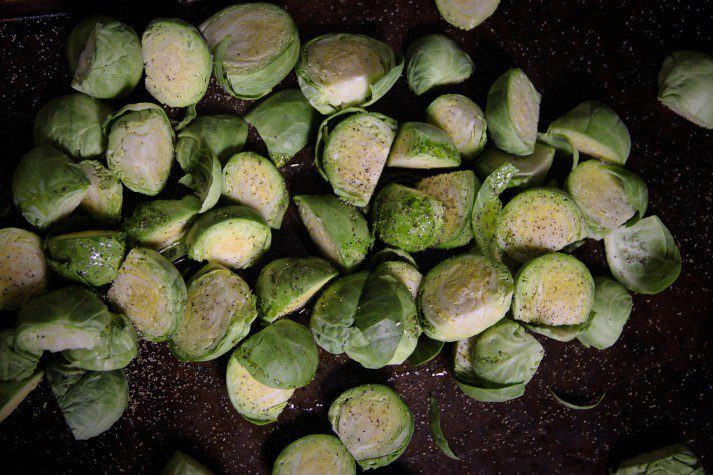
And make roasted veggies:
- Cut them up literally however you want (bite-sized pieces work best).
- Drizzle/toss them toss in olive oil, sprinkle salt and pepper.
- Put them on a foil-lined pan in the oven at 400 degrees F (200 degrees C) for 20-30 minutes.
- Once they look like they’re cooked (a deeper color and slightly brownish edges), take them out of the oven.
- Write down how long they were in for, and eat them!
Don’t overthink this: You can use more olive oil or use less. You can use more salt or use less. You can leave them in there a few minutes longer. Just cut them up, drizzle, and plop them in!
Here’s my recipe for stupidly simple roasted asparagus:

- Put them on a cookie sheet lined with aluminum foil.
- Drizzle each asparagus stalk in olive oil.
- Sprinkle salt and pepper on them.
- Stick them in the oven at 375 degrees F for 12 minutes.
DONE. Crunchy, delicious, and nutritious.
Plus, I felt like a 5-star chef!

#3) Sautéed Vegetables: Cooked on the stovetop! Simple, delicious.
Zucchini and squash both taste great with just a little oil and salt, and are super easy to prepare.
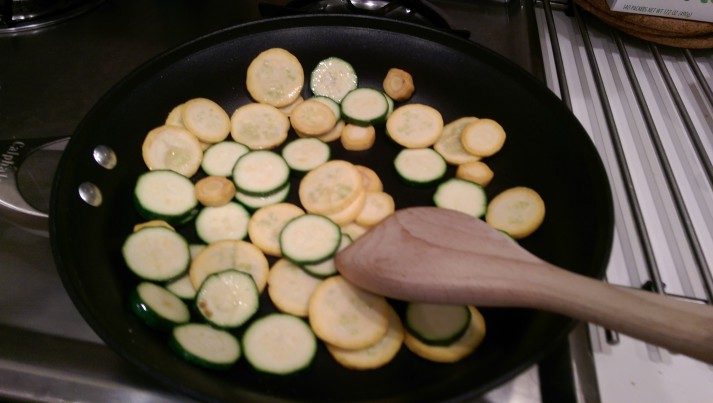
You can choose to:
- Slice them up into slivers
- Use a potato peeler to create noodle-like slices.
Throw the slices into a pan with some olive oil on medium-high heat for about five minutes until they become soft and lighter in color.
All of these options can be paired with basically any protein for a delicious and healthy meal (or eaten as a healthy, stand-alone snack!).
If you attempt to cook a vegetable and burn them to a crisp and “fail,” I’ll still be proud of you. We all suck at stuff the first time, so the sooner we get those first few attempts out the way, we can get to “not sucky,” and then…
One day…
We’ll actually get pretty good at preparing vegetables!
What are the Best Tasting Vegetables? (The NF Veggie Challenge)
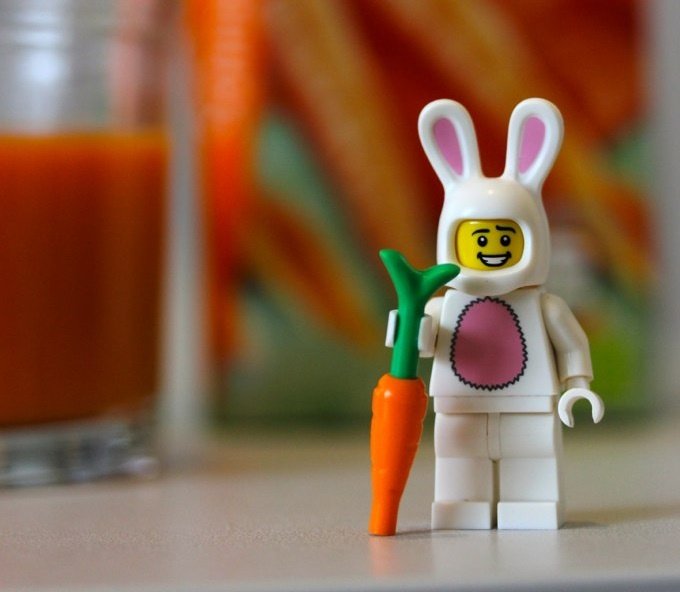
“Steve! What are the best-tasting vegetables!?”
Great question.
You’re a unique snowflake, and so are your tastebuds.

They will evolve and change as you evolve and change.
So the best advice I can give you is to try lots of veggies, prepared lots of different ways.
Microwaved Brussels sprouts might be soggy and unappetizing, but take the same veggie, cooked in bacon fat and roasted in the oven?
MMMMMM!
So try multiple veggies, in multiple ways, as part of multiple meals. Keep trying until you find a variation you like!
A final note: the point of eating more vegetables is to fill your plate with low-calorie but nutrient-dense food.
If you’re still overwhelmed at the thought of eating veggies, or you’ve always struggled to stick to a diet for any meaningful amount of time, you are NOT alone.
It’s why we’ve created three key services that help people lose weight, get stronger, and live better:
#1) Our 1-on-1 Online Coaching Program: Get personalized nutrition advice that won’t scare you and handcrafted workouts from a coach that gets to know you. We’ve heard “this program is the first time I’ve ever been 100% honest with another human being about my struggles with food.”
#2) Nerd Fitness Prime: Need lots of recipes to choose from? Want someone to walk you through cooking them? Join Nerd Fitness Prime!
Nerd Fitness Prime is our premium membership program that contains workouts and cooking classes with NF Coaches, lessons on how to cook, tons of healthy recipes, a supportive online community, group challenges, and much more!
#3) Join the Nerd Fitness Rebellion!
We have a free email newsletter that we send out twice per week, full of tips and tricks to help you get healthy, get strong, and have fun doing so.
I’ll also send you tons of free guides that you can use to start leveling up your life too:
- Follow our 10-level nutrition system at your own pace
- What you need to know about weight loss and healthy eating
- 3 Simple rules we follow every day to stay on target
NOW, Are you up for the Nerd Fitness Veggie Challenge?
For the next four weeks, I want you to try ONE new vegetable each week:
- Use 20 seconds of courage to try a new vegetable as a side when you go out to dinner.
- Buy a new vegetable at the grocery store and learn to prepare it.
- Add vegetables discreetly to your favorite meals (mix in with your smoothies, add to your omelets, etc.).
- Learn to prepare a vegetable in a new way. Whether it’s roasting them in the oven or grilling them on the bbq, try a different way to prepare a vegetable and level up your cooking skills.
Leave a comment and let us know!
We’d love to hear from you:
If you hate vegetables, what are you taking away from today’s post?
Do you have a clever way to get more vegetables into your diet? Share please!
What’s keeping you from starting to eat vegetables, and how can we help?
-Steve
PS: Make sure you read the rest of our healthy eating content!
- How to eat healthy 101: Start eating healthy today
- How to go grocery shopping like a pro.
- Cooking 101: essential kitchen tools
- Cooking 101: essential knife skills
###





0 comments :
Post a Comment